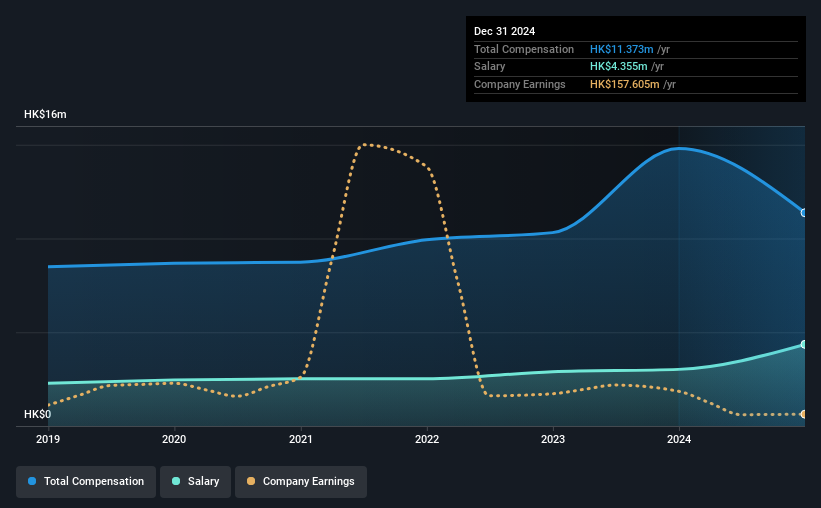Should Shareholders Reconsider Hi Sun Technology (China) Limited's (HKG:818) CEO Compensation Package?
Key Insights
- Hi Sun Technology (China) will host its Annual General Meeting on 21st of May
- Total pay for CEO Man Chun Kui includes HK$4.36m salary
- Total compensation is 759% above industry average
- Hi Sun Technology (China)'s three-year loss to shareholders was 62% while its EPS was down 64% over the past three years
Hi Sun Technology (China) Limited (HKG:818) has not performed well recently and CEO Man Chun Kui will probably need to up their game. Shareholders can take the chance to hold the board and management accountable for the unsatisfactory performance at the next AGM on 21st of May. This will be also be a chance where they can challenge the board on company direction and vote on resolutions such as executive remuneration. The data we present below explains why we think CEO compensation is not consistent with recent performance.
Check out our latest analysis for Hi Sun Technology (China)
Comparing Hi Sun Technology (China) Limited's CEO Compensation With The Industry
According to our data, Hi Sun Technology (China) Limited has a market capitalization of HK$993m, and paid its CEO total annual compensation worth HK$11m over the year to December 2024. We note that's a decrease of 23% compared to last year. We think total compensation is more important but our data shows that the CEO salary is lower, at HK$4.4m.
On comparing similar-sized companies in the Hong Kong Diversified Financial industry with market capitalizations below HK$1.6b, we found that the median total CEO compensation was HK$1.3m. This suggests that Man Chun Kui is paid more than the median for the industry. Moreover, Man Chun Kui also holds HK$232m worth of Hi Sun Technology (China) stock directly under their own name, which reveals to us that they have a significant personal stake in the company.
| Component | 2024 | 2023 | Proportion (2024) |
| Salary | HK$4.4m | HK$3.0m | 38% |
| Other | HK$7.0m | HK$12m | 62% |
| Total Compensation | HK$11m | HK$15m | 100% |
On an industry level, roughly 72% of total compensation represents salary and 28% is other remuneration. It's interesting to note that Hi Sun Technology (China) allocates a smaller portion of compensation to salary in comparison to the broader industry. It's important to note that a slant towards non-salary compensation suggests that total pay is tied to the company's performance.

A Look at Hi Sun Technology (China) Limited's Growth Numbers
Over the last three years, Hi Sun Technology (China) Limited has shrunk its earnings per share by 64% per year. In the last year, its revenue is down 14%.
Few shareholders would be pleased to read that EPS have declined. And the impression is worse when you consider revenue is down year-on-year. So given this relatively weak performance, shareholders would probably not want to see high compensation for the CEO. Although we don't have analyst forecasts, you might want to assess this data-rich visualization of earnings, revenue and cash flow.
Has Hi Sun Technology (China) Limited Been A Good Investment?
Few Hi Sun Technology (China) Limited shareholders would feel satisfied with the return of -62% over three years. So shareholders would probably want the company to be less generous with CEO compensation.
To Conclude...
Along with the business performing poorly, shareholders have suffered with poor share price returns on their investments, suggesting that there's little to no chance of them being in favor of a CEO pay raise. At the upcoming AGM, the board will get the chance to explain the steps it plans to take to improve business performance.
CEO compensation is an important area to keep your eyes on, but we've also need to pay attention to other attributes of the company. We identified 3 warning signs for Hi Sun Technology (China) (1 is potentially serious!) that you should be aware of before investing here.
Arguably, business quality is much more important than CEO compensation levels. So check out this free list of interesting companies that have HIGH return on equity and low debt.
Have feedback on this article? Concerned about the content? Get in touch with us directly. Alternatively, email editorial-team (at) simplywallst.com.
This article by Simply Wall St is general in nature. We provide commentary based on historical data and analyst forecasts only using an unbiased methodology and our articles are not intended to be financial advice. It does not constitute a recommendation to buy or sell any stock, and does not take account of your objectives, or your financial situation. We aim to bring you long-term focused analysis driven by fundamental data. Note that our analysis may not factor in the latest price-sensitive company announcements or qualitative material. Simply Wall St has no position in any stocks mentioned.
 Wall Street Journal
Wall Street Journal